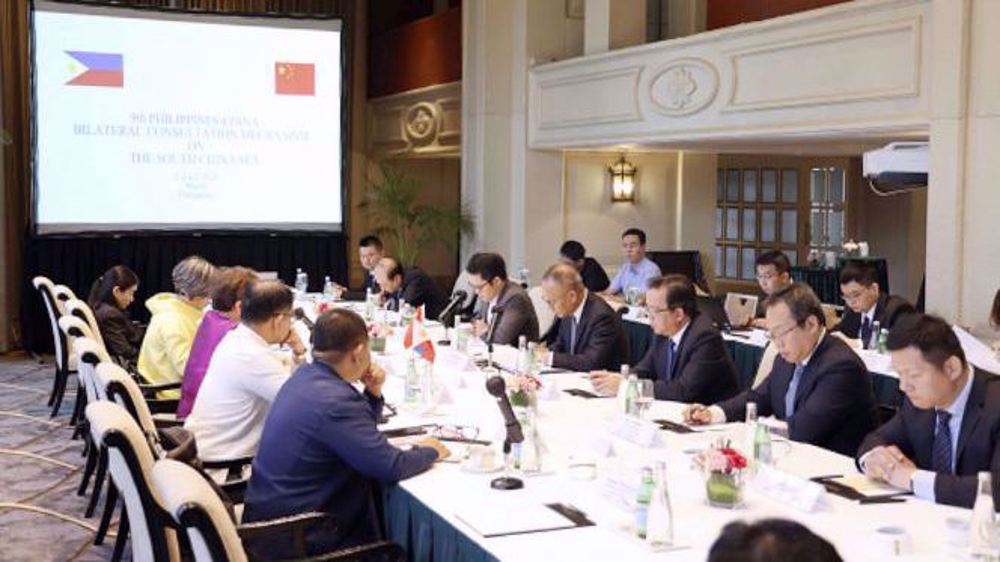US doing disgusting things to create rifts between China, neighbors: Beijing mission in Myanmar
Beijing’s embassy in Myanmar says the United States is resorting to “disgusting” actions aimed at containing China by tarnishing its image and driving a wedge between the country and its neighbors over the disputed South China Sea and Hong Kong.
The Chinese mission in Yango said in a statement on Sunday that Washington was “outrageously smearing” China by falsely claiming that Beijing was undermining the sovereignty of its Southeast Asian neighbors.
The US agencies abroad, it said, were doing “disgusting things” to contain China and had showed a “selfish, hypocritical, contemptible, and ugly face” in the anti-Beijing campaign.
The Chinese mission was responding to a statement on Saturday by the US embassy in Yangon, which claimed China’s actions in the South China Sea and Hong Kong were part of a “larger pattern to undermine the sovereignty of its neighbors.”
The US statement also likened China’s actions in the South China Sea and Hong Kong to large-scale Chinese investment projects in Myanmar, which are criticized by Washington.
China, however, said the US accusations were indicative of Washington’s “sour grapes” towards “flourishing China-Myanmar relations” and were “another farce on a global tour by the US authorities to shift the attention on domestic problems and seek selfish political gains.”
“The US should first look in the mirror to see whether it still looks like a major country now,” it added.
China and the US have been engaged in a new war of words in recent weeks over the South China Sea — most of which is claimed by Beijing — and the developments in semi-autonomous Hong Kong, where the mainland has recently introduced a new national security law.
On Hong Kong, Washington has openly voiced support for opponents of the law, who claim it would undermine the city’s autonomy and the “one country, two systems” principle.
China has rejected the American stance as interference in its domestic affairs.
Last week, President Donald Trump signed an executive order that would end the preferential economic treatment of Hong Kong as well as a law requiring sanctions over Beijing’s handling of Hong Kong.
This prompted China to promise retaliatory sanctions on US individuals and entities.
In the South China Sea case, Washington takes sides with Beijing’s rivals in the maritime dispute and routinely sends warships and warplanes to the waters to assert what it calls its right to freedom of navigation.
China has repeatedly called on Washington to stop the provocative actions, which undermine peace and stability in the sea.
The South China Sea serves as a gateway to global sea routes, through which about 3.4 trillion dollars of trade passes each year. Vietnam, Taiwan, the Philippines, Malaysia, and Brunei have overlapping claims with China to parts of the sea.
Earlier this month, US Secretary of State Mike Pompeo said Washington rejected most of China’s claims over the sea.
‘US must decide if it can coexist with a strong, prosperous China’
The Chinese ambassador to the US said in an interview with the CNN that Washington needs to make a “fundamental choice” about whether it can cooperate with China in the modern world.
“We certainly have a legitimate right to build our country into a modernized, strong, prosperous country, like every other country in the world,” said ambassador Cui Tiankai.
“The fundamental question for the United States is very simple,” he said. “Is the US ready or willing to live with another country with a very different culture, very different political and economic systems…in peace and cooperate on so many and still growing global challenges?"
He also said that Beijing is ready to work with Trump and his administration to build a “more stable and stronger relation.”
Relations between the US and China have hit the lowest level in decades. The two are at loggerheads over a number of other issues as well, including trade, Taiwan, and the coronavirus pandemic.
VIDEO | Press TV's news headlines
July 26: ‘Axis of Resistance’ operations against Israeli occupation
Palestinian resistance fighters hit Israeli Merkava 4 tanks
VIDEO | UK police brutal assault on Muslim family sparks outrage, protests
Hamas: Death of leader in Israeli jail amounts to murder
EU sends €1.5 billion to Ukraine from frozen Russian assets
VIDEO | Millions of Yemenis rally for Gaza, call for more anti-Israel operations
UN chief calls for Olympic truce as games begin in Paris












 This makes it easy to access the Press TV website
This makes it easy to access the Press TV website